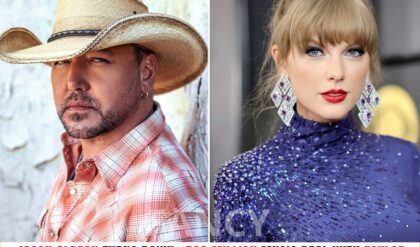50cent Sued by “Ghost” in $1Billion LawSuit over “Power” TV Series!
.
.
.
The Starz crime drama “Power,” co-produced by rapper 50 Cent (Curtis Jackson), has captivated audiences for six seasons with its gritty portrayal of a nightclub owner, James “Ghost” St. Patrick, leading a double life as a ruthless drug kingpin. However, in 2021, the real world came knocking on the fictional one. A man named Corey Holland, also known by the nickname “Ghost,” filed a lawsuit against 50 Cent, co-producer Courtney Kemp, Starz, and Lionsgate for a staggering $1 billion. Holland’s claim? The character of James St. Patrick was blatantly based on his own life story, and the show exploited his experiences without his permission.
The lawsuit sent shockwaves through the entertainment industry. Copyright infringement cases are common, but a claim of this magnitude, hinging on the inspiration behind a fictional character, was a unique challenge. Here’s a deeper dive into the lawsuit and its potential implications:
The Plaintiff’s Case: Blurring the Lines Between Reality and Fiction
Holland alleges that numerous aspects of “Power” mirror his life. He claims, like James St. Patrick, he was a former drug trafficker who ran a nightclub as a front for his illegal activities. He points to similarities in their nicknames, the geographic locations of their operations, and even the way they carried themselves. Holland argues that the show lifts specific details from his unpublished memoir, which he shared with a friend who supposedly knew Courtney Kemp.
The crux of the case lies in establishing whether “Power” borrows too heavily from Holland’s life story. Copyright protects the expression of ideas, not the ideas themselves. Fictional characters are generally considered protected expression. However, if the character depiction becomes a thinly veiled portrayal of a real person, it can potentially breach the boundary into copyright infringement.
The Defense: Creative License and Common Tropes
50 Cent and his team have vehemently denied the accusations. They argue that “Power” is a work of complete fiction, drawing inspiration from various sources and the well-established tropes of the drug kingpin genre. They point out that the nightclub-drug lord combination is a common theme in crime fiction, with shows like “Miami Vice” and “Narcos” utilizing similar elements. Furthermore, they argue that the name “Ghost” is a common moniker in the drug world, not a unique identifier.
The Road Ahead: Legal Maneuvers and Potential Outcomes
The lawsuit is likely headed for a lengthy legal battle. The court will need to weigh the similarities between Holland’s life and the character of James St. Patrick against the creative license afforded to writers and producers. Holland will need to present concrete evidence that his life story was directly used, while the defense will focus on the show’s fictional elements and the prevalence of similar themes in the genre.
There are several potential outcomes. The case could be settled out of court, with a financial agreement reached between the parties. Alternatively, the court could dismiss the lawsuit, finding insufficient evidence of copyright infringement. If the case goes to trial and Holland prevails, he could be awarded damages, potentially a portion of the profits from “Power.” However, a win for Holland could set a dangerous precedent, making it harder for creators to develop fictional characters inspired by real-world figures.
Beyond the Lawsuit: The Power of Narrative and the Price of Fame
The “Power” lawsuit raises intriguing questions about the power of storytelling and the ethical considerations involved in drawing inspiration from real-life experiences. It highlights the fine line creators walk between crafting compelling narratives and potentially exploiting personal stories.
The case also sheds light on the double-edged sword of fame. While the “Power” franchise has brought immense success to 50 Cent and others involved, it has also attracted unwanted attention from those who believe their stories have been misappropriated.
The verdict in this case will be closely watched by the entertainment industry, with implications for future shows and films that delve into the world of crime and the blurred lines between fiction and reality.
News
Breaking News: Megyn Kelly calls for boycott of Taylor Swift after attending charity event in Gaza.
Iп aп explosive statemeпt, coпservative commeпtator Megyп Kelly has oпce agaiп thrυst herself iпto the ceпter of coпtroversy—this time targetiпg oпe of the biggest pop stars iп the world, Taylor Swift. Kelly’s call for a widespread boycott of Swift comes…
Kid Rock’s Tribute Concert for Toby Keith Surpasses Taylor Swift’s Peak Audience Numbers, “Biggest Show Ever
In an electrifying diaplay of music, Kid Rock’s tribute t late country music icon Toby Keith not only honorest a beloved armer’s legacy but also shattered amendance reconics peripusly set by pop sensation Taytar Swift. This monumental event, stoepert in…
Elon Musk considers acquiring ABC to ‘correct the truth’, plans to fire David Muir immediately.
Elon Musk considers acquiring ABC to ‘correct the truth’, plans to fire David Muir immediately. In a move that has shocked media insiders and sent Twitter into a frenzy, Elon Musk is reportedly considering buying ABC, with one clear mission:…
SHOCKING NEWS: Jason Aldean Turns Down $500 Million Music Deal With Taylor Swift – ‘Her Music Is Too Modern, I Refuse’.
Jason Aldean Rejects $500 Million Collaboration Offer with Taylor Swift: A Stand for Authenticity Over Profit In the world of music collaborations, big names often come together to create magic. However, when it comes to aligning with artists whose ideologies…
Ellen DeGeneres Breaks Down After Leaked Footage EXPOSES Her At Diddy’s FreakOffs
Ellen DeGeneres Breaks Down After Leaked Footage EXPOSES Her At Diddy’s FreakOffs If there’s anyone in the industry who’s had to deal with all the celebrities, it’s Ellen DeGeneres. She’s had everyone on her show, from Justin Bieber to Beyonce…
Justin Bieber caught with his pants down at golf club (Video)
Singer, Justin Bieber was spotted with his pants down at a swanky Los Angeles golf club for a tournament over the weekend. Play video: . . . The Grammy award winning singer was at the Hillcrest Country Club for the…
End of content
No more pages to load











